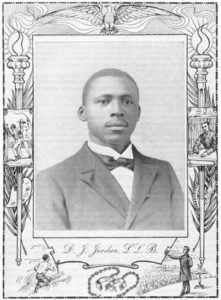
Dock J. Jordan
*D. J. Jordan was born on this date in 1866. He was a Black lawyer, author, politician, educator, historian, and activist.
Dock Jackson Jordan was born to Giles and Julia Jordan in Cuthbert, Georgia. Giles Dolphus Jordan was born a slave in 1840 in South Carolina and died in 1898 in Early County, Georgia. On June 24, 1867, he registered to vote in Early County, two years after his emancipation from slavery.
He was a slave at the Westmoreland Plantation in Spartanburg, South Carolina. The elder Jordan was a Circuit Rider and 25-year A.M.E. minister. Julia Elmira White was born a slave in August 1847. She ensured that each of her eight children attended school; she died on December 2, 1933, in Blakely, Georgia.
Young Jordan graduated in 1892 from Allen University in Columbia, South Carolina, with a B.S. and an LL.B. degree and was admitted to practice law by the South Carolina Supreme Court in May 1892. In 1900, he received his M.A. degree at Allen. After moving to Atlanta, Georgia, he was admitted to practice there. According to records held by Columbia University, Jordan furthered his education and received his B.S. in 1925 and his A.M. in 1928 from Teachers College at Columbia University. Jordan joined the faculty of Morris Brown College in Atlanta in 1893 as a Professor of Science and Dean of Law before accepting the position of President of Edward Waters College in Jacksonville, Florida, in November 1895.
Also, in 1893, he was a Republican nominee for the state legislature in Randolph County, Georgia, and in 1894, a delegate to the state convention. In addition, in 1894, Professor Jordan gave a 10-minute speech that aided in defeating Tom Watson as a candidate for Governor of Georgia. He was appointed lay delegate to the A.M.E. Church in 1896, 1904, and 1912. In 1897, he returned to Morris Brown to teach Literature, remaining until 1898, when he was appointed Vice President of the institution and Professor of Mathematics. He taught a semester at Clark Atlanta University in 1901. From 1905 until 1909, he served as Principal of City School in Atlanta.
On December 31, 1895, he married Carrie Thomas Jordan, a pioneer Jeanes Supervisor in Durham, North Carolina, and principal in Atlanta. He was the father of six children: Alice Julia Jordan, Lawrence Jordan, prominent A.M.E. Bishop Frederick Douglass Jordan, Julian Jordan, Frances Marie Jordan, and Edwin Adolphus Jordan.
In 1909, Jordan moved his family to Kittrell, North Carolina, to accept the presidency of the now-defunct Kittrell College. His daughter, Alice Julia Jordan, was born on the campus. In 1912, he moved to Greensboro, North Carolina, to serve as head of the Department of History and Pedagogy at North Carolina Agricultural and Technical College (now North Carolina Agricultural and Technical State University). He was also head of the Teacher's Training School and established numerous training workshops for Black educators in other states. 1915, Jordan was profiled in Who's Who Of The Colored Race. By this time, he had distinguished himself as a writer and commencement speaker. He contributed his articles to such publications as the Atlanta Review, Atlanta Constitution, A.M.E. Review, Indianapolis Review, the Raleigh Independent, and countless others.
On July 14, 1917, the Independent, then owned by Black leader Charles N. Hunter, published a letter from Jordan to President Woodrow Wilson, speaking out against his policies on Blacks and condemning the administration for the East St. Louis Riot. Jordan's letter was re-published in newspapers throughout America and attracted nationwide attention. Whites dismissed the letter as "foolish, yet treasonable, dangerous and full of dynamite." Many sought to punish Jordan, though black leaders assured Governor Thomas Bickett at the time that they would handle the situation caused by the letter.
After 1914, Jordan served simultaneously as an instructor at A&T and North Carolina College. In 1918, he became head of the Department and Professor of History at what is now North Carolina Central University and was the only history professor listed at the school until 1939.
On July 14, 1917, a letter that Jordan wrote criticizing President Woodrow Wilson's policies on Blacks and condemning the administration for the East St. Louis Riot was published in the Raleigh Independent. The letter was subsequently published in newspapers throughout the United States, thrusting Jordan into national prominence. Dock Jackson Jordan died on October 20, 1943, and is buried in Beechwood Cemetery in Durham. Jordan also taught government at NCCU until his retirement in 1943. Jordan's home, The Dock J. Jordan House, was located on the university campus until it was demolished in the mid-2000s.